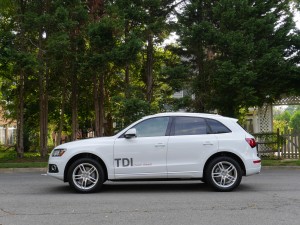Audi’s Diesel Strategy: The 2014 A6 TDI, A7 TDI, and Q5 TDI
The balance between power and economy is something Audi and its competitors have been battling, with Mercedes-Benz transitioning from a V6 to a four-cylinder turbo diesel in the E-Class, and BMW shifting to a four-cylinder diesel in the 3 series. All told, an economy-biased V6 in the A7 is more fun to drive than a four, so it is a compromise that we will have to live with, unless, of course, Audi decides to import their performance-based diesel, the SQ5 TDI.
with Mercedes-Benz transitioning from a V6 to a four-cylinder turbo diesel in the E-Class, and BMW shifting to a four-cylinder diesel in the 3 series. All told, an economy-biased V6 in the A7 is more fun to drive than a four, so it is a compromise that we will have to live with, unless, of course, Audi decides to import their performance-based diesel, the SQ5 TDI.
Our economy figure for this leg of the challenge was a lackluster 26.1 mpg (9.01 l/100 km). Undoubtedly this was due largely to the manner in which the car was driven. That still exceeded the EPA city estimate of 24 mpg (9.8 l/100 km)..
2014 AUDI Q5 TDI
I recently drove the Q5 2.0T, which was the previous “efficient” (albeit a non-diesel) model, promising 20 mpg (11.76 l/100 km) city and 28 (8.4) on the highway, and was let down by its anemic performance, it lacked the power reserve to get out of trouble in traffic, and generally felt quite limited. Audi’s decision to install the 3.0-liter V6 TDI in the Q5, however, made all the difference in the world.
The fit between this car and engine is perfect. The power was more than adequate,  it handled well in traffic and on curvy roads, and I never felt disadvantaged as I had in the four-cylinder version. I don’t know how else to explain the feeling I had in the Q5, besides that there was a balance, and Audi had managed to find the sweet spot.
it handled well in traffic and on curvy roads, and I never felt disadvantaged as I had in the four-cylinder version. I don’t know how else to explain the feeling I had in the Q5, besides that there was a balance, and Audi had managed to find the sweet spot.
In terms of efficiency, driving the Q5 out of Washington, D.C. in the morning was a realistic scenario of the average driving cycle. We attained 31.4 mpg (7.49 l/100 km), which exceeded the highway fuel economy rating of 31 (7.58) – and there was very little of the “highway” cycle in our modified circuit – the GPS had lost our routing and we took a slightly more direct route to the meeting point than other drivers, who managed as much as 39.1 mpg (6.01 l/100 km). Comparing this directly to the 20.1 mpg (11.76 l/100 km) attained in mixed driving in the Q5 2.0T that I had driven in Florida, leaves no doubt as to which engine is the better choice.
BOTTOM LINE
Audi’s diesel strategy looks like that of a good German football team – and to succeed in the Bundesliga, you have to be pretty damn good. The Ingolstadt-based automaker is attacking the marketplace with solid products, and if the take rates of the A3, A8, and Q7 TDI models are any indication, diesel is poised to represent a significant percentage of Audi’s sales in the U.S. in the coming years. I hope that is the case, too, because Audi’s engineers have quite a few more economical and fun-to-drive tricks up their sleeves, and someday they might just find their way here.






















